By Ivan Viehoff
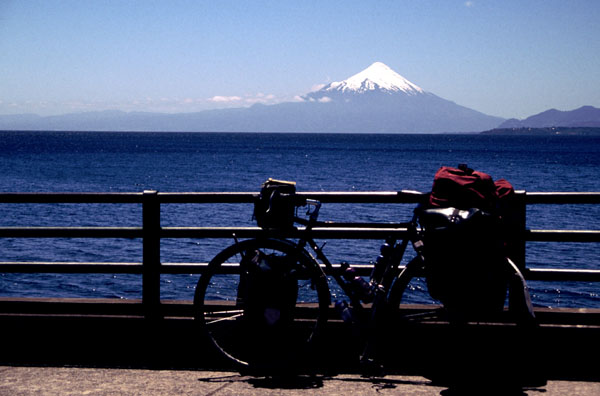
Departure
By Ivan Viehoff

Departure
I was 35. I was single. I was totally screwed up and stressed out. My hair was falling out. Why was I working every hour the devil sends? What was the money for? What was life for? I decided to give it up and go to South America with my bicycle.
“You’ll be back in three months,” said my therapist. “You need
me.”
“I can’t come with you,” said my old cycling friend Simon. “Zeneca
Pharmaceuticals don’t approve of career breaks.”
“You’ll lurve Australia, “ said George the office Australian.
“Don’t forget to take a packet of condoms, “ said Brendan, a concert-going
friend. “I’ll be lucky to need them,” I thought.
Anne said nothing. She didn’t even know. She was my ex-girlfriend, but that didn’t stop us checking each other out from time to time, just to make sure. But the last time really had been the last time. Finally, it seemed, I could start forgetting.
I went to the airport to catch my deep discount one-way flight to Santiago, Chile. My mother shed a few tears. Waiting through the traditional three hour delay, I went to Boots to buy a packet of condoms.
First Hazards
My first moments in Chile are no welcome. Leaving Santiago airport
onto a busy dual carriageway, a 2” nail instantly speared my tyre.
Hundreds of cars were honking horns with people hanging out of their sunroofs,
waving flags and shouting. 10km later I had another puncture, my
spare tube already used. Dripping in the humid 30 degree heat outside
a stinking butcher’s shop, it took three attempts to get a patch to stick.
Every 100 metres was a junction with traffic lights and soot-belching buses
cutting me up. I was heading for a hostel, but when I got there I
obviously had the wrong address. Standing by a park in the late afternoon
sun, three policemen jumped out of a car and arrested a man just 20 metres
from where I stood. Downtown, I could find nothing but hamburgers
and hot-dogs to eat.
In mid-evening the city erupted. The 12-lane Alameda was completely
blocked. The noise of horns and chanting washed all around.
A political demonstration? Revolution? No, a football match.
Chile beat Bolivia 3-0. The afternoon’s madness was but mild anticipation
for this. Welcome to South America.
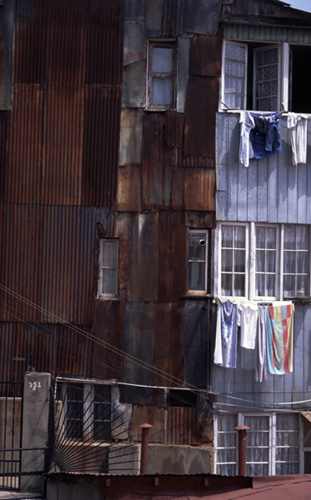
Valparaíso
I took a trip to Valparaíso, an attractive seaport 100km from Santiago. Here, in the main square, a young woman started chatting to me. Let us call her Carla, for it was the name she gave. We can say she was 28, for she volunteered it. Carla is morena, the colour of the dominant racial mix of colonist and native. I rather fancied her brown skin, her strong arms, her smallness. Within an hour she was showing me the contents of her handbag. A while later and I had an offer of marriage.

"Carla"
Carla wants to leave the poverty of Chile. I can start by taking her to Santiago with me. There was no illusion about what might be on offer back in my hotel. I want to believe what she says. I am alone and lonely in a distant land. I have my packet of condoms. But eventually I twigged. I wonder who had bought her nice new clothes and her yellow suede shoes. Firmly I took my leave, lying as I promised to send a card. I have only her photo as a memory of my prudence.
First Friends
I phoned Kathryn, a kiwi backpacker I met on a stop-over in Buenos Aires. “You’ve got to meet José,” she said. “I met him last night. He’s a real Chileno cyclist, mad about the countryside. But don’t mention Argentina.”
So it was that a Chileno I had never met, and his Irish friend Iain, took me out to dinner in an Argentinean restaurant in a wealthy suburb. We talked about cycling in Chile. It was made clear to me that Chile had all the great scenery I needed. Argentina wasn’t worth the candle. We just ate its food. And a few days later, when my excess baggage finally arrived, I was on an overnight bus down to the green Chilean south. This is the land of volcanoes and lakes where the monkey-puzzle trees grow. But just now looking out of the bus window into the grey dawn and grassy fields, I could have been at home in England.
This was supposed to be an easy start, a paved road into the foothills. But things are rarely that simple. For 20km the road surface was lifted for repairs. Immediately I can see that things were not altogether right with the bike. Things are bending that shouldn’t bend. Rack screws are working loose.
I locked the bike outside a grocer in Curacautín, a small town. “Who do you think we are?” said a young man. “We aren’t thieves in this town.” Suddenly the city seemed a long way away.
At lunchtime the next day I am in a bus-shelter and I am freezing.
The rain is pouring down, and only a little higher in the hills it is snowing.
This is supposed to be practically summer. And I am not so far south,
not yet. I don’t have many clothes because I thought I would buy
them when I needed them. Without warning I already need them.
A logger is trying to say something to me, but I cannot penetrate his accent.
Eventually another man comes and invites me into a warm building for a
hot drink. He is the headmaster of the village school. He invites
me to lunch, then dinner. I help his daughters with their English,
and I stay the night.
I learn of the poverty of his village. Malalcahuello is a peasant
agricultural community. Today small scale agriculture is uneconomic,
and animals wander the village uncared for. The logging and road-building
only employ a fraction of community. The village is surrounded by
national parks and nature reserves, but there is no tourist industry here
yet. The population can no longer support itself. 5 years ago
a volcano rained down ash on them. The village was evacuated for
a month and a year’s crops were lost.
First Disaster
In the morning mist the volcanoes are still hidden. I get a hitch through a single-track tunnel, allegedly the longest on the continent. It used to be a rail tunnel, but today cars drive on gravel with the rails still showing through. We have to wait half an hour to get a slot in our direction.
The intermittent road surface soon runs out for good. I replace a loose rack bolt with a stronger steel one. I turn onto a minor road to climb a pass. There is still snow on the ground at the top, among the monkey-puzzles. On the descent the first bottle-cage sheers off. The others will follow within days. As afternoon arrives, the sun occasionally shows its face, and I see parrots chattering in the pines. The front rack sheers its new bolt. The scenery is changing to grassland. Goats wander past. I wave at gauchos on horses.
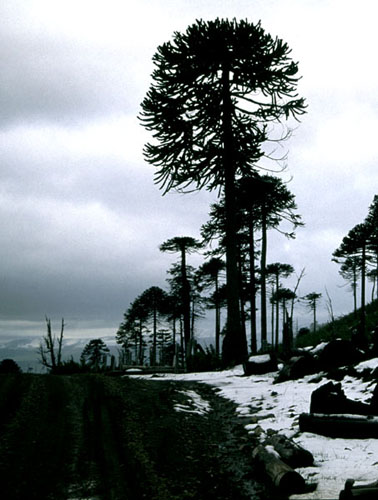
Monkey puzzles in the snow
And then suddenly I am on the ground, and the momentum of the bike gives me a blow in the chest I will feel for a month. The front pannier rack flexed into the wheel and is now twisted round the axle. An hour later, time I can ill afford this late in the day, I am back on the road with all my luggage piled on the back rack.
I am lost. The junction isn’t on the map. The village isn’t on the map. There is no one to ask. I guess the way. Finally I find someone to ask. The people round here are Mapuche natives, marking off their home-fields with lines of thick rough-hewn stakes. I am going the wrong way. I feel every corrugation, every rock, in the broken road as I struggle back through the wind to the junction and take the other turning. Practically another hour, wasted.
The dogs are a pain. Approaching another Mapuche village there is a huge black dog in the road. I am expecting trouble, because I am barely going faster than walking pace on this hill. As I get closer the dog turns into a thin pig and trots off. Finally I make the remote resort village of Icalma, just a scattering of rude buildings, with one primitive guesthouse, and uncarpeted candle-lit rooms. I’ve missed dinner, so I set up my camp stove in the garden.
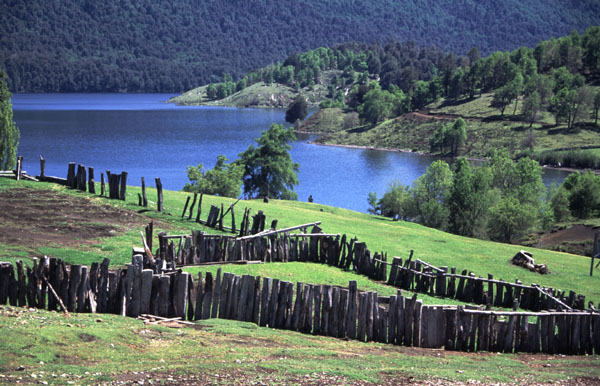
Mapuche fields near Icalma
In the morning sunshine I enjoy the tranquility of Icalma lake, right on the Argentina border. “You can’t go this way,” a local calls. “It’s flooded. You’d be better to go to Lonquímay.” Back the way I have come. A detour of hundreds of kilometres. I’d rather cross to Argentina. I bet he’s exaggerating. Sure enough, the muddy wading lasts only a few hundred metres and is no more than shin deep. The road is the worst yet, but the scenery the best. I get clear views of Llaima volcano, which I have been circumnavigating the past three days.
More Racks
A couple of days later I hole up at La Torre Suiza, a hostel run by Swiss cyclists. Claudia makes real muesli for breakfast. The dining room has a fine view of Villarrica volcano. Since it is always raining, they have stuck a picture of the volcano on the window, so you know what it looks like. They show me their bicycles with many times re-welded front racks. You need a good steel rack they tell me. But they do not know how to get one in Chile. I buy a primitive rack from a bike shop that wouldn’t look out of place in a 1930s period drama. It is a rear rack, but somehow we fit it on the front. I buy a thick woolly jumper in the handicraft market.
A few days later I pass through ever poorer villages and struggle over a rough pass over the shoulder of the volcano. The monkey-puzzles and southern beech are of a size unknown in England. They astonish me and drip on me. The weather is bad again, and there are no views. The new rack flexes like it is about to snap off on every pot-hole. Arriving in Pucón, a more up-market resort, I find a more modern bike shop. I buy a more modern rack. It is a Taiwanese copy of the real thing. It’s alloy, but perhaps it will do for a while.
Old Ways
Curarrehue is a traditional colonial village up a terrible road. The roads always get worse as you get near the border. This time I am truly on my way to Argentina. I am still not happy with the rack, and I want to see if they have better bike shops over there before I go to really remote places. I give the camp-site a once over. I can cope with the complete destruction of the lavatory. I can cope with asking householders for water. I decide that I cannot cope with the free-range horses. So I head back into the village to look for the only guesthouse.
They point at the Big House, an enormous yellow-painted wooden affair. I am not sure I believe it. A maid greets me at the back door. I am at the right place. The price is high, but I am stuck. A rivet in my pannier is broken, and a workman says he will lead me down to the cobbler. As we walk down through the front garden, a parade of twelve men come the other way, two by two. One at the front is wearing a suit and tie, the first I have seen since Santiago, and he looks more like an accountant than a farmer. “That’s the dueño,” says the workman. “And the others?” “They’re his men.” “What do they do?” “They collect the rent. He owns all the land round here.” The cobbler has no rivets to mend my pannier. We fix it back at the house with a nut and bolt. As time passes, I will fix every rivet in my panniers in this way.
As I cook my dinner in the kitchen, the dueño comes in and chats to me for a while. Although in his forties, he isn’t married, which is unusual in Chile. He eats en familia with his men. A well dressed broad-shouldered 12-year-old boy joins them, the son of his first-in-command. They are served by the maid, the only woman I see in the house, who eats in the kitchen with me. Upstairs, next to the guest room, there is a dormitory where the men all sleep. This is the traditional pattern of rural control in Chile which Allende strove to break so disastrously 25 years before.
Into Argentina with Luck
It takes most of the day to climb the pass to Argentina. The road hasn’t seen any recent maintenance, and it is a mess. Further on, they are maintaining it, and that’s a mess too. The border lies under the shadow of Lanín volcano, the tallest of the region. The border guards take their time. They create some bureaucracy for entertainment’s sake. There’s no traffic, so what’s the hurry?
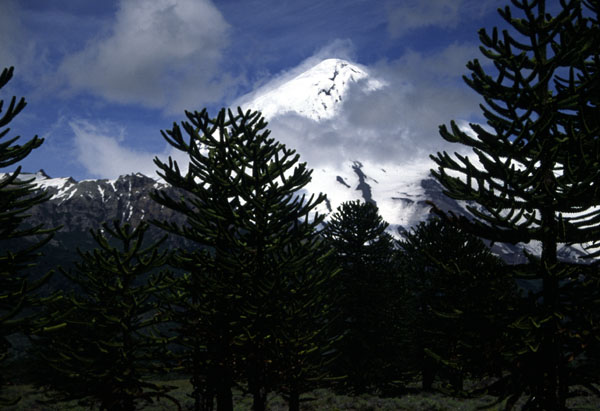
Lanín
It’s different in Argentina. The dense forests and green fields give way to more open woods, and then to arid plains of steppe grasses and spiny cushion plants, the pampa patagónica. The rain-clouds give way to sun. The houses are brick, not wood. Cars stop and people lean out to pass the time of day. The better kept towns could be in Europe. The prices could be European too. In Chile practically all the travellers are outsiders, but in Argentina most of the travellers are Argentineans. It is not just the greater wealth of the country, for in truth the difference is not so large, but it is symptomatic of a more worldly view. The chilenos live in a narrow strip between mountain and sea, desert at one end and ice at the other, isolated from the world, with little thought of broadening the mind, and little thought that the outside world matters except as a market for their products. The argentinos live on a vast wide plain, just as remote, but dreaming of the world outside, somehow forgetting that they need to find an economic raison d'être if the trips to Paris are to carry on.
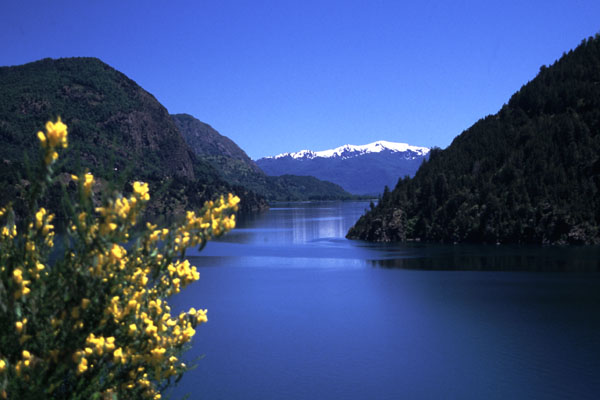
Near San Martín de los Andes
Near the chocolate-box resort of San Martín de los Andes, I climb the pass of Arroyo Partido, the divided stream. The rivers on each side of the pass somehow join in the middle. One side goes to the Atlantic, the other to the Pacific. The beautiful Siete Lagos, or Seven Lakes, road starts here. My new rack soon shows its distaste for its terrible surface. As I fix it up for the fourth time, I spot the design fault the Taiwanese copyists have added to the original specification.
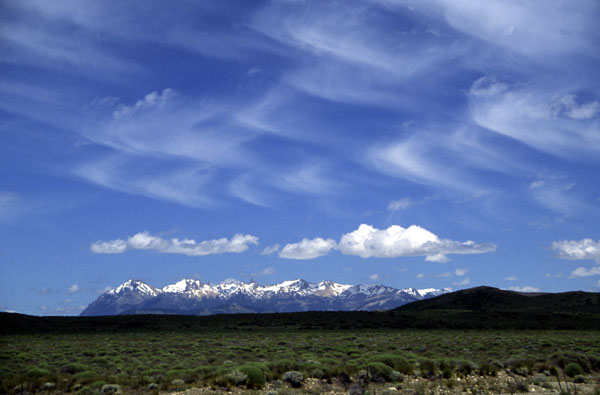
Sky, mountain, pampa
In Bariloche I stay in a hostel run by Belgian cyclist Carlos Vlaene. The bike shops in town cannot fix me up. But he tells me of a frame builder just outside town. When he isn’t playing the saxophone, Miguel Nitzsche works out of his garden shed to build custom bicycles with home-made tools. And he does a line in custom steel racks. I am rescued. I cannot believe my luck.
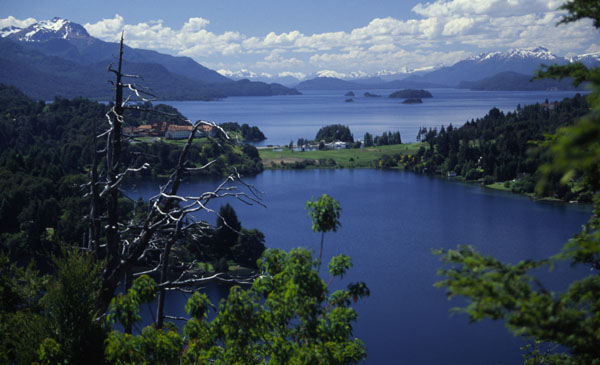
Llao Llao
Small Hazards
Back in Chile the sun is now shining on the volcanoes and lakes. I am riding through flat farmland, but the roads are still terrible. After a hot day, I empty my water bottle and a small unidentified animal, about the size of my thumb comes out, cooked. Its presence explains the persistent bowel trouble I have been suffering. I am almost sick when I see it. I ask the landlady for bleach.
In the morning there is a small earthquake, and I cycle off into the sunshine.
Ivan Viehoff, August 2001
